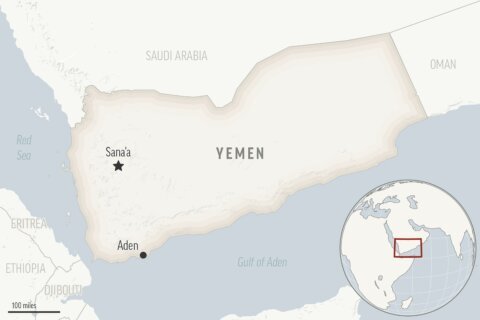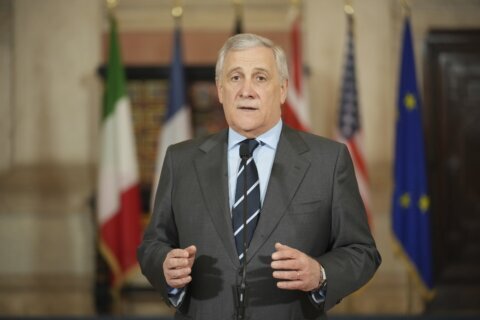BUENOS AIRES, Argentina (AP) — When libertarian President Javier Milei assumed office one year ago, Argentine supermarkets were marking price increases on an almost daily basis. Middle-class families tried to spend their rapidly depreciating pesos as quickly as they got them, and economists warned the country was teetering on the brink of hyperinflation.
It was popular outrage over this upside-down economy that fueled the rise of Milei, a self-declared “anarcho-capitalist” and former TV pundit who rode to power on vows to “blow up” the central bank, take an axe to the bloated government and kill sky-high inflation.
It was an almost impossible job, and Milei’s lack of government experience, unkempt hairdo, sexual boasts and missionary-like zeal for his dead dog, the Rolling Stones and the free market didn’t inspire much confidence in a country with a history of failed economic reforms.
“It wasn’t a given that he could govern Argentina when he took office,” said Marcelo J. García, Americas director at geopolitical risk firm Horizon Engage. “He was Mr. Nobody.”
On taking power, Milei implemented a series of austerity measures, including slashing energy and transportation subsidies, laying off tens of thousands of government workers, freezing public infrastructure projects and imposing wage and pension freezes below inflation.
It has been brutal. Unemployment has climbed, economic activity has declined and poverty has surged.
But now signs have emerged that Argentina’s bizarre and long mismanaged economy is starting to look a little more normal.
Monthly inflation has plummeted, bonds have rallied and the closely watched gap between the black market dollar and the official rate has shrunk as much as 44%. Argentina’s country-risk index, an influential measure of the risk of default, is at its lowest point in five years.
“He reaches the anniversary at the best moment of his administration,” García said.
Inflation: a priority
Inflation, Argentina’s perpetual scourge and Milei’s top priority upon coming to office, slowed from a monthly rate of 25.5% in December 2023 to just 2.7% in October — its lowest level in three years.
“Inflation has gone down faster than what everyone has expected,” said Ignacio Labaqui, a Buenos Aires-based senior analyst at risk consultancy Medley Global Advisors. “That’s something that validates his narrative and sustains his popularity.”
In a sign of Milei’s long way to go — and the unmitigated shambles he inherited — Argentina’s annual inflation rate remains at 193%.
But Argentines are paying closer attention to month-to-month inflation, taking the sharp decline as a sign that Milei’s fiscal shock therapy is paying off.
“Last year it was a shock to the system, I couldn’t keep up with the prices,” said 34-year-old deli worker Jazmin Quintana. “I’m not saying I like the guy, I find his personality very weird and aggressive, but I admit — if he continues on this route I’ll be very happy.”
A stronger peso
A stronger peso is also boosting confidence. The black market dollar price has dropped since July, narrowing its gap with the official rate of 980.
Chileans, once accustomed to bargain-hunting in Argentina, are now surprised to see the traffic reversed. Shoppers unable to afford iPhones and kitchen appliances in Argentina arrive at Chilean border towns by the busload to get the most bang from their buck. The customs office shut down briefly last month because officials were overwhelmed.
Underpinning the currency appreciation is a new tax amnesty to lure Argentines to declare their hidden U.S. dollar savings — longs squirreled away in offshore bank accounts and under mattresses. Ahead of the first-phase deadline on Oct. 31, the scheme drew some $19 billion into Argentina’s banks, the tax agency reported, boosting scarce foreign exchange reserves.
But a strong peso also carries risks — squeezing domestic industry by making exports more costly, deterring investors and raising fears of a crash. Foreign visitors are warned of higher prices as peak tourism season begins.
“The prices are INSANE,” reads a popular Reddit post about travel in Argentina, filled with cautionary tales of $50 dinners and $100 T-shirts.
Painful consequences
Argentina’s first budget surplus in 12 years has come at a steep cost. Milei halted inflation increases for university budgets, leaving some universities struggling to keep their lights on and elevators running. He downgraded the culture ministry, closed the national theater institute, shuttered a state-funded news agency and defunded scientific research.
He suspended public works projects, leaving cities littered with white-elephant structures. An estimated 200,000 construction workers lost their jobs in the last year, says the Argentine Chamber of Construction.
The brutal austerity has deepened Argentina’s recession, with consumer spending falling 20% percent in the past year and poverty rates soaring to a two-decade high of 52.9% in the second half of last year.
Argentina’s retirees are perhaps the most potent symbol of the strife inflicted by Milei’s fiscal shock.
Some of the government’s biggest savings came from holding down the real value of pensions. The average minimum monthly pension is just $300.
“We have always been in bad shape, but now things are even harsher,” said Rubén Cocurullo, 76, among dozens of pensioners protesting at the social welfare office in Buenos Aires last week. “Do they want to kill us?”
An uncertain future
In a country with a long history of raucous street protests, it’s striking that the mass unrest pundits predicted last year has not materialized.
That his approval ratings have held up at some 50% is also a sign of how desperately Argentines wanted change after years of crisis.
“Strangely enough, there comes a time in all societies, when the cost of a fiscal adjustment becomes less than the cost of continuing with inflation,” said Sebastián Mazzuca, an Argentine political scientist at Johns Hopkins University. “It’s like a fire. There are badly injured people, but the fire was put out, wasn’t it?”
It helps Milei that Argentina’s left-leaning Peronist opposition is in disarray, with former President Alberto Fernández charged with beating his ex-wife while in office.
Many also attribute the social peace to Milei’s expectation management. He warned that things would get worse before they got better.
But now, as an ebullient Milei declares his government the most successful in history and assures Argentines they’ll soon collect on the economic revival he pledged would follow the pain, the bar is getting higher even as risks remain.
To fulfill his promise of transforming the heavily regulated nation into one of the world’s freest economies, Milei needs to lift strict currency controls. That requires a fresh infusion of cash or a new deal with the International Monetary Fund, which would relieve pressure on the billions of dollars in debt repayments due next year.
Foreign investors, as well as the IMF, to which Argentina owes an unprecedented $44 billion, have expressed excitement about Milei’s changes. But, still haunted by Argentina’s 2001 crisis — which culminated in the largest foreign-debt default in modern history — they’re cautious.
“Argentina still seems to be mired in a major ‘wait and see’ period,” said consulting firm Zuban Córdoba and Associates in a report on Milei’s first year.
The radical populist hopes to profit from his budding bromances with President-elect Donald Trump and tech billionaire Elon Musk. As president of the biggest shareholder of the IMF in 2018, Trump was key to Argentina securing a record $56 billion loan package.
The three men dined and danced together at Trump’s Mar-a-Lago club in Florida last month. Milei claims his brutal cost-cutting inspired Trump and Musk to plan their so-called Department of Government Efficiency.
Last week the Conservative Political Action Conference brought its traveling program to Buenos Aires, where Milei and right-wing political figures railed against socialism, praised Trump and pledged to battle what they saw as the global scourge of liberal “woke-ism.”
“Everyone assumed that we were going to fail politically,” Milei told the cheering crowd. “Today they admit, through gritted teeth, that they are surprised.”
___
Associated Press reporter Debora Rey contributed to this report.
____
Follow AP’s coverage of Latin America and the Caribbean at https://apnews.com/hub/latin-america
Copyright © 2025 The Associated Press. All rights reserved. This material may not be published, broadcast, written or redistributed.






